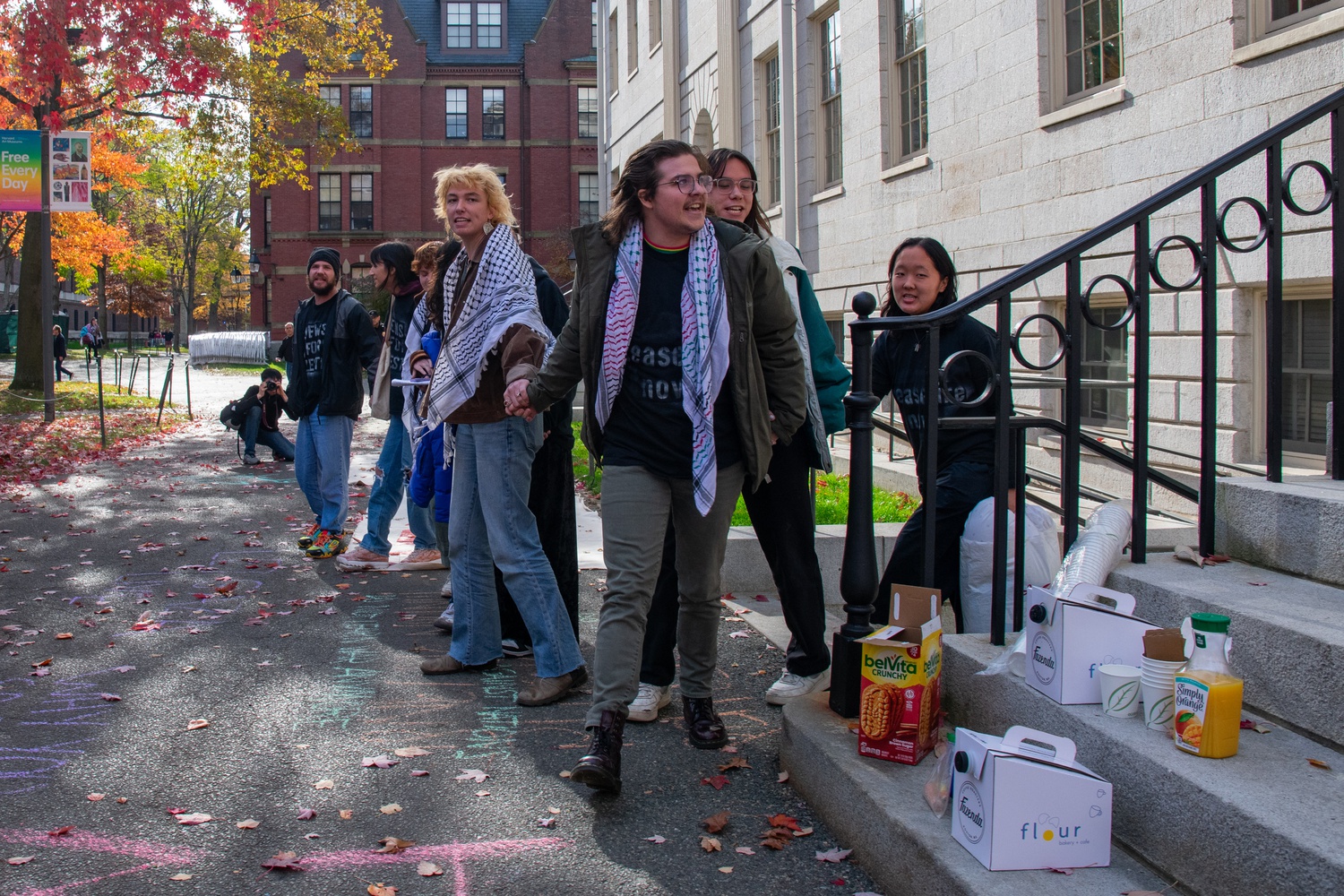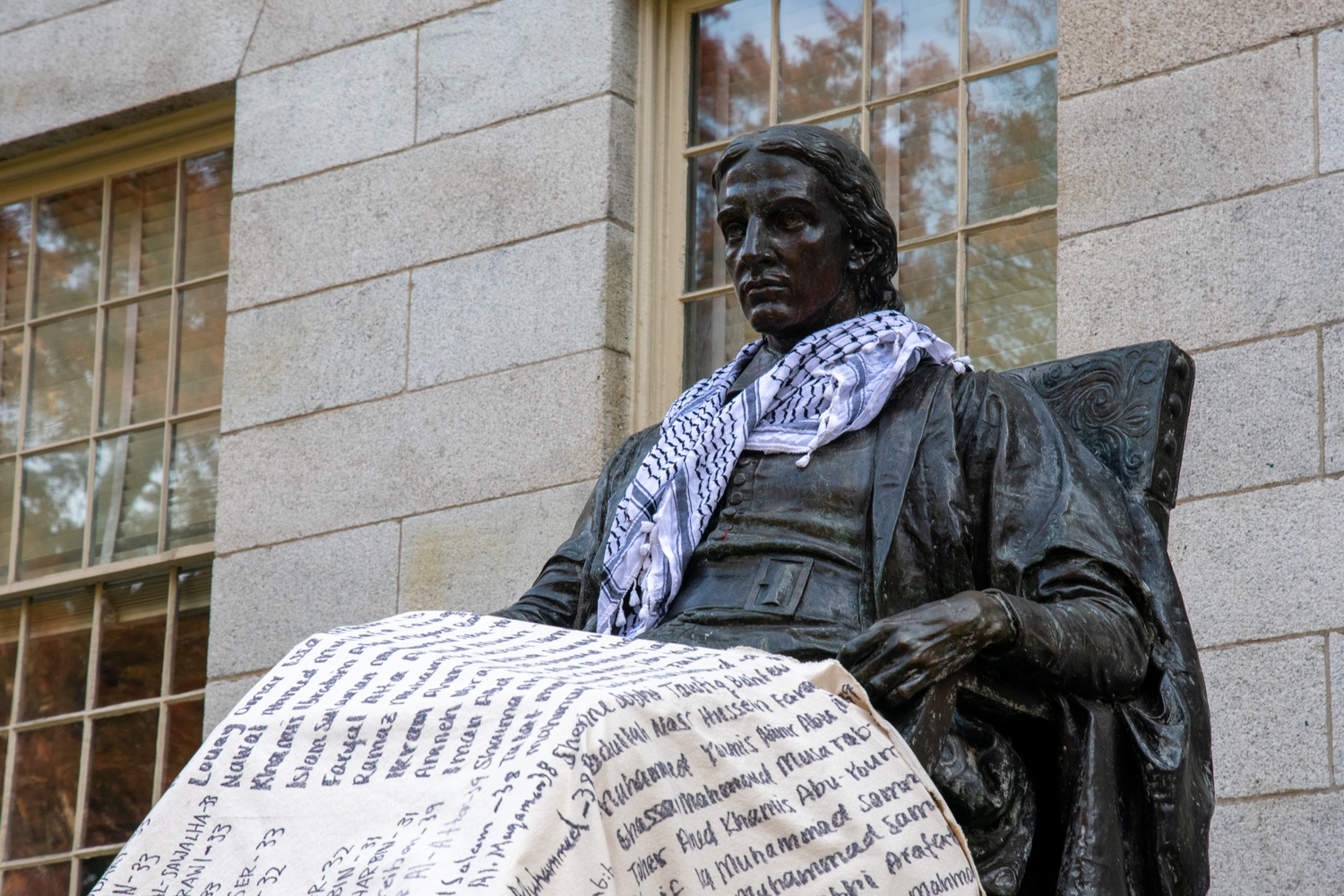
News
Progressive Labor Party Organizes Solidarity March With Harvard Yard Encampment

News
Encampment Protesters Briefly Raise 3 Palestinian Flags Over Harvard Yard

News
Mayor Wu Cancels Harvard Event After Affinity Groups Withdraw Over Emerson Encampment Police Response

News
Harvard Yard To Remain Indefinitely Closed Amid Encampment

News
HUPD Chief Says Harvard Yard Encampment is Peaceful, Defends Students’ Right to Protest
After 24 Hours, Pro-Palestine Harvard Students End Occupation of University Hall

Updated: November 17, 2023, at 3:18 p.m.
After just over 24 hours occupying University Hall, a group of pro-Palestine Jewish students and allies ended their sit-in just past 11:30 a.m. Friday morning — though they said their demands remain unmet.
Dozens rallied outside the building in support as the nine remaining demonstrators emerged from University Hall’s basement entrance — followed by a police officer — while holding hands and chanting “Ceasefire now.”
Violet T.M. Barron ’26, a Crimson Editorial editor and one of the students who occupied University Hall, said in a speech Friday morning that it is “far past time” to push for a ceasefire.
“Harvard must do this,” Barron said. “The University claims that it stands for its students. Well, President Gay and Dean Khurana, it has been made abundantly clear what your students want, and we will not stop fighting until our demands are met.”
Maya M.F. Wilson ’24, another organizer who participated in the sit-in, thanked students for their support throughout the protest.
“We have felt the power of solidarity in our bones over the past 24 hours,” said Wilson, a Crimson Magazine editor. “The warmth of your smiles and your love and your tears and your chants and your songs and your dances and your messages have made this so easy for us.”
About a dozen students initially occupied University Hall Thursday morning, prompting the Harvard University Police Department to block access to the building and Securitas to tighten security around Harvard Yard.
The demonstration was organized by Harvard Jews for Palestine, an unrecognized student group of pro-Palestine Jewish undergraduates and allies. According to a statement the group posted to Instagram, they demanded Harvard administrators release a call for a ceasefire in Gaza, make a statement saying that antisemitism was not the same as anti-Zionism, and create a committee to investigate Islamophobia and suppression of pro-Palestine speech on campus.
As of Friday morning, organizers said the University had not agreed to any of their demands.

Other students and affiliates rallied in support of the demonstration twice on Thursday at the John Harvard statue, calling for a ceasefire and demanding Harvard administrators allow food to be given to the demonstrators. Around 9 p.m. Thursday night, Harvard College Dean Rakesh Khurana and Adams House Faculty Dean Salmaan Keshavjee provided the students with burritos.
Just before 11 p.m. Thursday, Khurana gave them the chance to leave the building without facing disciplinary action, Wilson said.
In response, Wilson said, the demonstrators said they would leave if Khurana guaranteed they would not face disciplinary action, committed to providing written responses to their demands, and arranged a meeting between members of the group, other Palestinian Harvard students, and University President Claudine Gay.
Khurana said he could not accept the offer, Wilson said, and the students decided to remain in the building overnight.
College spokesperson Jonathan Palumbo declined to comment on the talks between students and Khurana early Friday morning.
“We know the protest has dispersed, and the students have exited the building,” Palumbo wrote in an emailed statement early Friday afternoon. “The College will review all relevant University conduct policies to determine the next steps and consequences.”
Harvard’s “University-Wide Statement on Rights and Responsibilities,” which the school adopted after the 1969 University Hall takeover by anti-Vietnam War protesters, defends peaceful protest that does not infringe upon the personal rights of Harvard affiliates — though the statement singles out occupation of administrative buildings as a cause for discipline.
It remains unclear if the students will face disciplinary action for the protest.
“We stayed because our demands are more important than the University’s threats,” Barron said Friday morning. “We stayed because we came to tell the administration that we will not stay silent while they continue to be complicit in apartheid, killing, and genocide.”
University spokesperson Jonathan L. Swain declined to comment on the criticisms.

In an email to faculty following the protest’s conclusion, Harvard Dean of the Faculty Hopi E. Hoekstra thanked Faculty of Arts and Sciences and University staff for ensuring campus safety throughout the demonstration.
“I want to reinforce that our community values the rights of our students to express their views. Freedom of expression is uniquely important to an academic community, as it is vital to advancing knowledge through teaching, research, and learning,” Hoesktra wrote. “However, there must be a careful balance — embracing free expression while also supporting our shared obligations to civility and respect on which our mission depends.”
Hoekstra — who declined to speak on the occupation and students’ demands during an interview with The Crimson as the protest was ongoing — informed faculty that University Hall would remain closed Friday. FAS administrators with offices in University Hall had been advised to work from home by a facilities official early Thursday, though some — like Khurana and Hoekstra — remained in the building.
The protest garnered significant criticism from some Harvard affiliates and political figures — including in a series of posts on X by Israeli government spokesperson Eylon Levy, who called the protesters “apologists” for Hamas.
“There will be no ceasefire that leaves our hostages in Gaza and Hamas in power,” Levy wrote in one post. “We will not leave Hamas free and emboldened to reoffend and perpetrate another October 7. Its reign of terror will end.”
Harvard Jews for Palestine declined to comment on Levy’s posts.
The occupation of University Hall came as Ivy League universities have grappled with how to address intense campus activism on the Israel-Palestine conflict after war broke out between Israel and Hamas.
At Brown University, students who participated in a similar building occupation were arrested and charged with trespassing just five hours after their protest began last week. At Columbia University, Students for Justice in Palestine and Jewish Voice for Peace organizers were suspended through the end of the semester for an unauthorized protest.
Harvard officials have imposed some consequences related to campus activism, including indefinitely relieving a College proctor of his duties following an altercation at a pro-Palestine “die-in” protest at Harvard Business School — though thus far, University officials have refrained from the large-scale disciplinary action seen at some peer colleges.
While organizers had initially said they would stay in the building until their demands were met or they were arrested, they decided to depart after 24 hours. Several of the group’s supporters stayed throughout the night, with some opting to sleep on the sidewalk and others taking turns staying awake and observing police.
Correction: November 17, 2023
A previous version of this article misquoted Maya M.F. Wilson ’24 as saying, “We have felt the power of solidarity in our phones.” In fact, Wilson said ”in our bones.”
—Staff writer Miles J. Herszenhorn contributed reporting.
—Staff writer Cam E. Kettles can be reached at cam.kettles@thecrimson.com. Follow her on Twitter @cam_kettles.
—Staff writer Elias J. Schisgall can be reached at elias.schisgall@thecrimson.com. Follow him on X @eschisgall.
Want to keep up with breaking news? Subscribe to our email newsletter.
